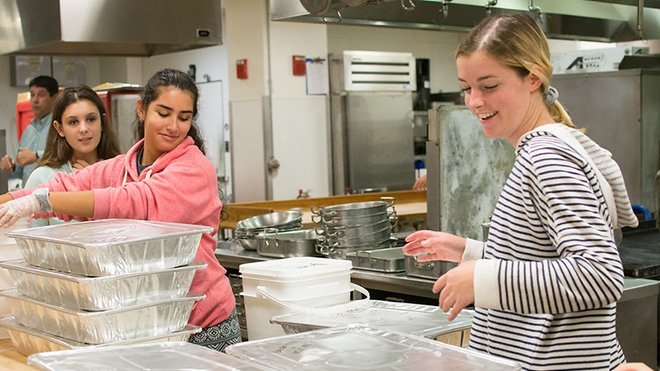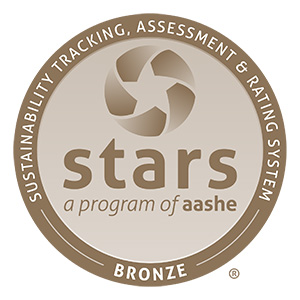Roger Williams University Earns STARS Bronze Rating for Sustainability
Sustainability achievements in academic programs, energy efficiency and more highlight university’s commitment to sustainable futures

BRISTOL, R.I. –As part of our commitment to creating a sustainable future, Roger Williams University is proud to receive a STARS Bronze rating in recognition of our sustainability achievements from the Association for the Advancement of Sustainability in Higher Education (AASHE).
With more than 900 universities and colleges participating in 40 countries, AASHE’s STARS program is the most widely recognized framework for comprehensive reporting of sustainability performance across academics, campus and community engagement, operations, planning and administration, innovation and leadership in institutions of higher education.
RWU’s highest points were received for sustainability initiatives in curriculum, diversity, and building and energy operations, along with community engagement, student and workplace wellbeing, administrative planning, and food and dining.
“I am thrilled to have Roger Williams University recognized for our efforts to ensure sustainable campuses and to develop future leaders and problem solvers who will create an even more sustainable future for society,” said RWU President Ioannis Miaoulis. “While this was the first time Roger Williams has conducted the comprehensive evaluation, the university has maintained a long-standing commitment to sustainability as a core value and strategic priority, and we look forward to building on this foundation to strive for even greater sustainability going forward.”
RWU’s most distinctive sustainability performance was in our academic programs. The university offers a total of 292 sustainability-related courses across our undergraduate and graduate programs, coming from 60 percent of academic departments. More than half of our yearly graduates earn a degree that provides learning outcomes related to sustainability, with special recognition for excellence in specifically sustainability-focused degrees for our B.A./B.S. in Environmental Science and M.S. in Preservation and immersive learning experiences focused on sustainability, such as the university’s highly active chapters in the Foundation for International Medical Relief for Children (FIMRC), Engineers Without Borders, and Habitat for Humanity.
 The university was also recognized for many initiatives where we monitor and measure energy consumption, greenhouse gas emissions and air pollutants to significantly reduce emissions and energy consumption through conservation and switching to renewable energy sources. The Bristol campus is powered 100 percent by renewable energy credits for wind power generated in the Midwest, while also making significant investments in net metering credits from a solar farm in Portsmouth, R.I., equivalent to 20 percent of our total energy usage currently and increasing to 80 percent by 2025. Additionally, RWU participates in a Strategic Energy Management Partnership with R.I. Energy, resulting in a recent shared investment in significant efficient-lighting upgrades and exploring options to transition away from gas and diesel generators to all-electric buildings that will be powered via renewable energy sources like fuel cells and industrial-scale batteries.
The university was also recognized for many initiatives where we monitor and measure energy consumption, greenhouse gas emissions and air pollutants to significantly reduce emissions and energy consumption through conservation and switching to renewable energy sources. The Bristol campus is powered 100 percent by renewable energy credits for wind power generated in the Midwest, while also making significant investments in net metering credits from a solar farm in Portsmouth, R.I., equivalent to 20 percent of our total energy usage currently and increasing to 80 percent by 2025. Additionally, RWU participates in a Strategic Energy Management Partnership with R.I. Energy, resulting in a recent shared investment in significant efficient-lighting upgrades and exploring options to transition away from gas and diesel generators to all-electric buildings that will be powered via renewable energy sources like fuel cells and industrial-scale batteries.
Not only does RWU have some of the highest-rated college food in the country, the university also netted all possible points for our sustainable dining initiatives. From farm to fork and sea to plate, our dining services partner Bon Appétit brings the freshest and most delectable ingredients to every meal, sourcing from local farmers and fishermen. And in partnership with the student-led Food Recovery Network, uneaten food does not go to waste at the end of the day: the university has donated more than 18,000 pounds of food to local women and children’s shelters since 2014.
Beyond our commitment to environmental health, the STARS program also scored RWU highly on human well-being due to our workplace wellness initiatives that positively affect the health, safety, and wellbeing of the campus community and initiatives to increase and support diversity, inclusion and equity. Both are important factors, as AASHE explains, that enable people to thrive and collaborate to address complex sustainability challenges and work toward environmental and social justice.
RWU was recognized for our commitment to embedding equity within university programs, practices, and policies, along with prioritizing equity and inclusion within our strategic plan and within our innovative educational and cultural programming. This past year, all students in the classes of 2026, 2025, and 2024 participated in a DEI course, while the incoming first-year students delved further into a DEI session focused on antiracist practices and becoming an upstander. Additional equity learning experiences are being built into future years, including an allyship course and co-curricular workshop on job search and workplace diversity.
The university was also recognized for our first-generation college student program S.O.A.R., affinity communities for women-identified, LGBTQ+ and BIPOC students and employees, and success in graduating students with financial need.
The STARS Bronze rating is a powerful recognition of RWU’s sustainability efforts and commitment to the human and environmental well-being of our community and campuses. With this foundational ranking, the university has already begun shaping and implementing new ideas and initiatives to help us continue to improve while measuring our progress through ongoing participation in STARS tracking reports every two years.